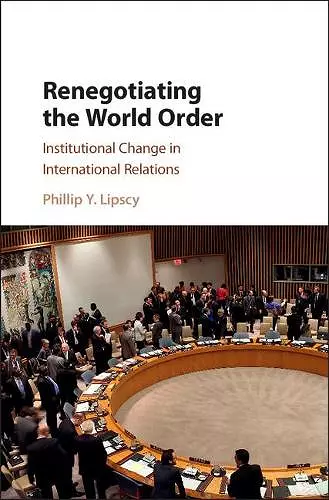Renegotiating the World Order
Institutional Change in International Relations
Format:Hardback
Publisher:Cambridge University Press
Published:9th Jun '17
Currently unavailable, and unfortunately no date known when it will be back
This hardback is available in another edition too:
- Paperback£30.99(9781316604281)

This book explains how countries renegotiate international institutions when rising powers such as Japan and China challenge the existing order.
Phillip Y. Lipscy explains how countries renegotiate international institutions when rising powers such as Japan and China challenge the existing order. This book is particularly relevant for those interested in topics such as international organizations, such as United Nations, IMF, and World Bank, political economy, international security, US diplomacy, Chinese diplomacy, and Japanese diplomacy.Rising powers often seek to reshape the world order, triggering confrontations with those who seek to defend the status quo. In recent years, as international institutions have grown in prevalence and influence, they have increasingly become central arenas for international contestation. Phillip Y. Lipscy examines how international institutions evolve as countries seek to renegotiate the international order. He offers a new theory of institutional change and explains why some institutions change flexibly while others successfully resist or fall to the wayside. The book uses a wealth of empirical evidence - quantitative and qualitative - to evaluate the theory from international organizations such as the International Monetary Fund, World Bank, European Union, League of Nations, United Nations, the International Telecommunications Satellite Organization, and the Internet Corporation for Assigned Names and Numbers. The book will be of particular interest to scholars interested in the historical and contemporary diplomacy of the United States, Japan, and China.
'Phillip Y. Lipscy shows, using rationalist theory, that variation in competition among international institutions explains variation in their willingness to undergo fundamental institutional change. Renegotiating the World Order is a theoretically innovative and empirically impressive book on an important topic.' Robert O. Keohane, Princeton University, New Jersey
'Why is it that some international institutional arrangements respond in flexible ways to changes in the distribution of power whereas others do not? Lipscy offers an original and persuasive answer to this question that troubles both policymakers and theorists. This book is a must read for anyone interested in understanding the past and future of international organizations.' Eric Voeten, Georgetown University, Washington DC
'How will rising states such at Brazil, China, and India seek to reshape the global order? Will they be responsible stakeholders working within the existing Western-led order, or will they be revisionists seeking to overturn it? … Lipscy provides the most elegant and systematic explanation yet for these diverse and shifting choices.' G. John Ikenberry, Foreign Affairs
'Lipscy's book provides well-written historical accounts with a compelling theory that provides both an academic case as well as fruitful insight for policy-makers.' Felicity Vabulas, Review of International Organizations
ISBN: 9781107149762
Dimensions: 235mm x 158mm x 22mm
Weight: 610g
338 pages